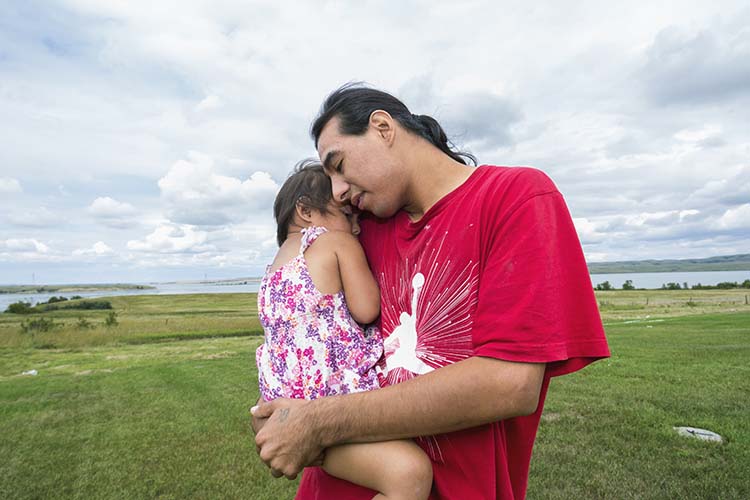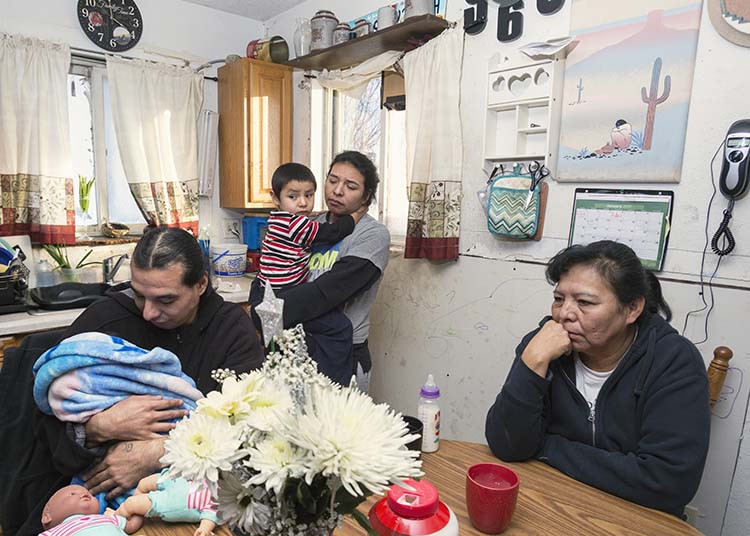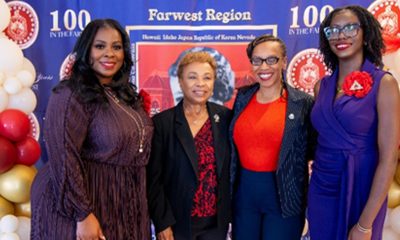Arts and Culture
Award-Winning Berkeley Refugee Photographer Documents Rural Life

When photojournalist Wesaam Al-Badry, a first-year student at UC Berkeley’s Graduate School of Journalism, went to rural North Dakota to photograph a Native American family struggling to stick together in the face of poverty and isolation, he actually moved in with the Thunderhawks for a few weeks.
Al-Badry, 34, didn’t have much money himself, and there wasn’t a nearby hotel where he could rent a room. And the experience of living on the edge of nowhere was familiar to Al-Badry, who escaped Iraq with his family in 1991 and spent two years in a refugee camp before coming to the U.S. and settling in Nebraska.
“I am happy when I am there because I feel like I am at home,” he says. “We talk; we spend endless hours just talking about cultures and traditions. It is that love of community and learning from one another that feels so familiar.”
Over the course of several week- or two-week-long visits, Al-Badry produced a series of evocative portraits of the Thunderhawk family that won him UC Berkeley’s 2019 Dorothea Lange Fellowship, a prize for faculty or graduate students who demonstrate outstanding work in documentary photography and have a creative plan for their future work.

Jen Thunderhawk, right, sits in the kitchen with her family.
Al-Badry’s photos capture Jen, the matriarch, trying to teach her children and grandchildren traditions of her Lakota tribe, the chaos created when 12 family members live under one roof and the everyday hardships of life on a reservation in the rural Midwest.
“I want people to understand that the struggle is real, that people are living day by day,” he says. “I also want people to understand how important the land is to these people.”
“I come from the poor working class,” he adds. “It wasn’t new to me. It wasn’t new to me when they talk about living paycheck to paycheck or trying to get 15 minutes of overtime for that little extra cash, or fighting their boss for their breaks.”
Al-Badry met the Thunderhawk family while he was covering the Standing Rock protests in 2016 and 2017. The Missouri River, which activists worried could be polluted by a breach in the contested Dakota Access Pipeline, runs right through the family’s backyard.
“When the media leaves, I ask myself, what is the aftermath for the people who are still there,” he says.
His question springs from his experience in the refugee camps of his youth, where he and his family often interacted with the news media. The experience led him to jobs at Al Jazeera America and CNN before he enrolled at Berkeley’s journalism school.
“The media can control the narrative of what gets told and how,” he explains. “I was on the other side of the lens for the longest time. I think subconsciously I am attracted to stories that have to do with me or my stories or my past.”
Al-Badry says he plans to use the $4,000 Lange fellowship to continue his work documenting the Thunderhawks, with the hope that he can someday publish their complete story.
And the story hasn’t stopped. The family’s home recently burned down, Al-Badry says, and a remarkably cold winter has made life even harder. Al-Badry was with the family earlier this month to document how they are adjusting and coping.
“I’ve been there for Jen’s birthday for the last three years,” he says. “Being with them for so long, you become part of that family.”
Contact Will Kane at willkane@berkeley.edu
Advice
COMMENTARY: If You Don’t Want Your ‘Black Card’ Revoked, Watch What You Bring to Holiday Dinners
From Thanksgiving to Christmas to New Year’s Day, whether it’s the dining room table or the bid whist (Spades? Uno, anyone?) table, your card may be in danger.

By Wanda Ravernell
Post Staff
From the fourth week of November to the first week in January, if you are of African descent, but particularly African American, certain violations of cultural etiquette will get your ‘Black card’ revoked.
From Thanksgiving to Christmas to New Year’s Day, whether it’s the dining room table or the bid whist (Spades? Uno, anyone?) table, your card may be in danger.
It could take until Super Bowl Sunday for reinstatement.
I don’t know much about the card table, but for years I was on probation by the ‘Aunties,’ the givers and takers of Black cards.
How I Got into Trouble
It was 1970-something and I was influenced by the health food movement that emerged from the hippie era. A vegetarian (which was then considered sacrilegious by most Black people I knew) prepared me a simple meal: grated cheese over steamed broccoli, lentils, and brown rice.
I introduced the broccoli dish at the Friday night supper with my aunt and grandfather. She pronounced the bright green broccoli undone, but she ate it. (I did not, of course, try brown rice on them.)
I knew that I would be allowed back in the kitchen when she attempted the dish, but the broccoli had been cooked to death. (Y’all remember when ALL vegetables, not just greens, were cooked to mush?)
My Black card, which had been revoked was then reattained because they ate what I prepared and imitated it.
Over the decades, various transgressions have become normalized. I remember when having a smoked turkey neck instead of a ham hock in collard greens was greeted with mumblings and murmurings at both the dining room and card tables. Then came vegan versions with just olive oil (What? No Crisco? No bacon, at least?) and garlic. And now my husband stir fries his collards in a wok.
But No Matter How Things Have Changed…
At holiday meals, there are assigned tasks. Uncle Jack chopped raw onions when needed. Uncle Buddy made the fruit salad for Easter. My mother brought the greens in winter, macaroni salad in summer. Aunt Deanie did the macaroni and cheese, and the great aunts, my deceased grandmother’s sisters, oversaw the preparation of the roast beef, turkey, and ham. My father, if he were present, did the carving.
These designations/assignments were binding agreements that could stand up in a court of law. Do not violate the law of assignments by bringing some other version of a tried-and-true dish, even if you call it a new ‘cheese and noodle item’ to ‘try out.’ The auntie lawgivers know what you are trying to do. It’s called a menu coup d’état, and they are not having it.
The time for experiments is in your own home: your spouse and kids are the Guinea pigs.
My mother’s variation of a classic that I detested from that Sunday to the present was adding crushed pineapple to mashed sweet potatoes. A relative stops by, tries it, and then it can be introduced as an add-on to the standard holiday menu.
My Aunt Vivian’s concoctions from Good Housekeeping or Ladies’ Home Journal magazine also made it to the Black people’s tables all over the country in the form of a green bean casserole.
What Not to Do and How Did It Cross Your Mind?
People are, of all things holy, preparing mac ‘n’ cheese with so much sugar it tastes like custard with noodles in it.
Also showing up in the wrong places: raisins. Raisins have been reported in the stuffing (makes no sense unless it’s in a ‘sweet meats’ dish), in a pan of corn bread, and – heresy in the Black kitchen – the MAC ‘n’ CHEESE.
These are not mere allegations: There is photographic evidence of these Black card violations, but I don’t want to defame witnesses who remained present at the scene of the crimes.
The cook – bless his/her heart – was probably well-meaning, if ignorant. Maybe they got the idea from a social media influencer, much like Aunt Viv got recipes from magazines.
Thankfully, a long-winded blessing of the food at the table can give the wary attendee time to locate the oddity’s place on the table and plan accordingly.
But who knows? Innovation always prevails, for, as the old folks say, ‘waste makes want.’ What if the leftovers were cut up, dipped in breadcrumbs and deep fried? The next day, that dish might make it to the TV tray by the card table.
An older cousin – on her way to being an Auntie – in her bonnet, leggings, T-shirt, and bunny slippers and too tired to object, might try it and like it….
And if she ‘rubs your head’ after eating it, the new dish might be a winner and (Whew!) everybody, thanks God, keeps their Black cards.
Until the next time.
Arts and Culture
Fayeth Gardens Holds 3rd Annual Kwanzaa Celebration at Hayward City Hall on Dec. 28
Kwanzaa celebrates seven principles – Nguzu Saba – that support an ideal of community, beginning from Dec. 26 to Jan. 1. Those principles, in Swahili, are: Umoja (Unity), Kujichagulia (Self-Determination), Ujima (Collective Work & Responsibility), Ujamaa (Collective Economics), Nia (Purpose), Kuumba (Creativity) and Imani (Faith).

Entertainment, vendors, and special honors for Sankofa Lifetime Achievement awardees
Special to The Post
Celebrating Ujima, the principle of ‘Collective Work and Responsibility,’ Fayeth Gardens’ 3rd Annual Kwanzaa Celebration will be held on Dec. 28, from 12 noon to 5 p.m.
Kwanzaa celebrates seven principles – Nguzu Saba – that support an ideal of community, beginning from Dec. 26 to Jan. 1.
Those principles, in Swahili, are: Umoja (Unity), Kujichagulia (Self-Determination), Ujima (Collective Work & Responsibility), Ujamaa (Collective Economics), Nia (Purpose), Kuumba (Creativity) and Imani (Faith).
The free event at Hayward City Hall at 777 B St. will feature live entertainment, a guest speaker, awards for community activists whose work reflects the principle of Ujima, vendors and an honoring of the ancestors by Awon Ohun Omnira (Voices of Freedom).
On stage will be the Touch of Class Band, a New Orleans Second-Line Band, and the California Griot Storytellers. Bring the children to have fun in the Kids Korner.
Velda Goe, who has been celebrating Kwanzaa since it started in the 1960s, noticed there was no public celebration of the holiday in Hayward when she moved to the city in 2008.
“I started it a couple of years ago,” she said, “and hopefully it will continue just like the cultural events by other nationalities (in Hayward). The Afro-descendent people of Hayward deserve cultural recognition as well.”
Goe also believes it’s important that Kwanzaa gets its due because “there are so many misconceptions,” particularly by people of other nationalities, who are under the impression “that Kwanzaa is a cult, a religion, or replaces Christmas.”
The celebration, which is open to all, can have the effect of helping guests see that Kwanzaa’a principles and purpose are common to all
This year’s Sankofa Lifetime Awardees are:
- Mrs. Freddye M. Davis: President of the South Hayward NAACP
•Baba Arnold X.C. Perkins: Co-founder of the Brotherhood of Elders
•Frederick Jordan,: Legendary founder of F.E. Jordan & Associates and the Design Engineer for the Charles P. Howard Container Terminal at the Port of Oakland + 1,000 Projects
Come dressed up in your best African wear to enter a raffle for a prize for best-dressed Afrocentric King and Queen.A free, healthy soul food lunch is available with an Eventbrite ticket, which can be found at for free lunch is available from for 11:30 to 12 p.m.
In its third year, the event is the brainchild of Velda Goe, founder of Fayeth Gardens, a community planting site to educate and provide a means for urban dwellers to grow healthy food for their families and develop life-sustaining eating habits.
Interested in being a vendor, volunteer, or sponsor? Reach out to FayethGardens@gmail.com
For tickets, go to: https://www.eventbrite.com/e/fayeth-gardens-3rd-annual-kwanzaa-celebration-at-hayward-city-hall-tickets-1974966953322
Activism
Essay: Intentional Self Care and Community Connections Can Improve Our Wellbeing
At the deepest and also most expansive level of reality, we are all part of the same being, our bodies made from the minerals of the earth, our spirits infused by the spiritual breath that animates the universe. Willingness to move more deeply into fear and pain is the first step toward moving into a larger consciousness. Willingness to move beyond the delusion of our separateness can show us new ways of working and living together.

By Dr. Lorraine Bonner, Special to California Black Media Partners
I went to a medical school that was steeped in the principles of classical Western medicine. However, I also learned mindfulness meditation during that time, which opened me to the multifaceted relationship between illnesses and the interconnecting environmental, mental and emotional realities that can impact an individual’s health.
Therefore, when I began to practice medicine, I also pursued training in hypnosis, relaxation techniques, meditation, and guided imagery, to bring a mind-body focus to my work in medical care and prevention.
The people I saw in my practice had a mix of problems, including high blood pressure, diabetes, and a variety of pain issues. I taught almost everyone relaxation breathing and made some general relaxation tapes. To anyone willing, I offered guided imagery.
“My work embraced an approach to wellness I call “Liberatory Health” — one that not only addresses the treatment and management of disease symptoms but also seeks to dismantle the conditions that make people sick in the first place.”
From my perspective, illness is only the outermost manifestation of our efforts to cope, often fueled by addictions such as sugar, tobacco, or alcohol, shackled by an individualistic cult belief that we have only ourselves to blame for our suffering.
At the deepest and also most expansive level of reality, we are all part of the same being, our bodies made from the minerals of the earth, our spirits infused by the spiritual breath that animates the universe. Willingness to move more deeply into fear and pain is the first step toward moving into a larger consciousness. Willingness to move beyond the delusion of our separateness can show us new ways of working and living together.
To put these ideas into practical form, I would quote the immortal Mr. Rogers: “Find the helpers.” There are already people in every community working for liberation. Some of them are running for office, others are giving food to those who need it. Some are volunteering in schools, libraries or hospitals. Some are studying liberation movements, or are working in urban or community gardens, or learning to practice restorative and transformative justice, or creating liberation art, music, dance, theater or writing. Some are mentoring high schoolers or apprenticing young people in a trade. There are many places where compassionate humans are finding other humans and working together for a better world.
A more compassionate world is possible, one in which we will all enjoy better health. Creating it will make us healthier, too.
In community, we are strong. Recognizing denial and overcoming the fragmenting effects of spiritual disorder offer us a path to liberation and true health.
Good health and well-being are the collective rights of all people!
About the Author
Dr. Lorraine Bonner is a retired physician. She is also a sculptor who works in clay, exploring issues of trust, trustworthiness and exploitation, as well as visions of a better world.
-

 Activism4 weeks ago
Activism4 weeks agoOakland Post: Week of November 12 – 18, 2025
-

 Activism4 weeks ago
Activism4 weeks agoIN MEMORIAM: William ‘Bill’ Patterson, 94
-

 Activism4 weeks ago
Activism4 weeks agoHow Charles R. Drew University Navigated More Than $20 Million in Fed Cuts – Still Prioritizing Students and Community Health
-

 Bay Area4 weeks ago
Bay Area4 weeks agoNo Justice in the Justice System
-

 #NNPA BlackPress3 weeks ago
#NNPA BlackPress3 weeks agoBeyoncé and Jay-Z make rare public appearance with Lewis Hamilton at Las Vegas Grand Prix
-

 Activism3 weeks ago
Activism3 weeks agoOakland Post: Week of November 19 – 25, 2025
-

 #NNPA BlackPress3 weeks ago
#NNPA BlackPress3 weeks agoLewis Hamilton set to start LAST in Saturday Night’s Las Vegas Grand Prix
-

 #NNPA BlackPress2 weeks ago
#NNPA BlackPress2 weeks agoLIHEAP Funds Released After Weeks of Delay as States and the District Rush to Protect Households from the Cold


















































